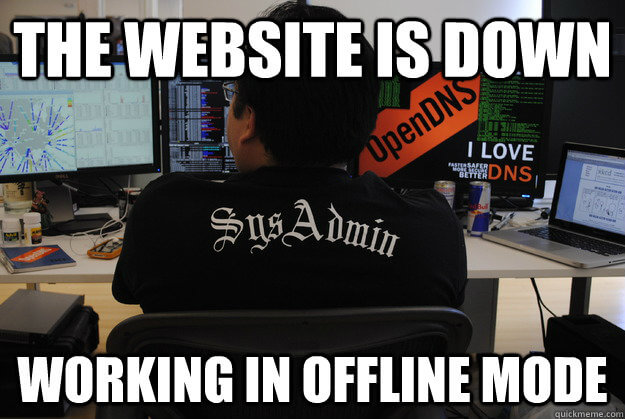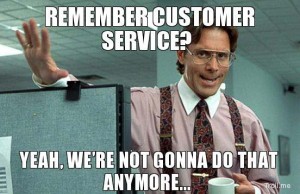Before starting iNode Cloud, I have been with Crazy Domain, Go Daddy and various other hosting companies only to be offered bad service and slow and inconsistent downtimes and there’s no shortage of web hosting companies that do this, Hence why i decided to start iNode Cloud.
Sometimes web hosts have technical problems or make mistakes, but when should you stick it out and when should you cut your losses and move on?
Here are the top six signs your web host isn’t up to the job.
1. Your website is flaky and keeps going down
No surprises here. If your website is unavailable or keeps throwing up errors, visitors will leave and not come back. Unless you’re offering something unique or already have a loyal following, this can kill your website in a very short time.
Overloaded servers and inadequate networks are likely causes of problems with your web host. Sometimes a web hosting company will start strong but get progressively worse as it gains more customers; a victim of its own success.
To be fair, it’s not always the fault of the web host. If your site is making unreasonable demands like using huge amounts of memory or processing time, there’s going to be trouble. Ideally, your web host will notice and prompt you to upgrade to a package with higher limits. The best ones will cover you if you get a sudden burst of traffic from the front page of Digg, and ask you to upgrade if it becomes a habit.
Having too much traffic is a good problem to have, but if your site is not scaling, you should look at ways to improve performance. Inefficiencies that didn’t matter when you have 100 visitors per day can become huge issues when you have 100 visitors per minute! The first thing to look at is caching, e.g. using one of the caching plugins for WordPress.
2. It’s… so… slow
Almost as bad as your site not being available is when it’s so slow that using it becomes a painful and frustrating experience. Again, unless you’re offering something unique, visitors are unlikely to put up with it. Wait 30 seconds for a page to load, or click the back button and try elsewhere? Click.
Again, overloaded servers are the most likely culprit. The budget web hosting business is all about customer numbers. It doesn’t become profitable unless you can fit a lot of customers on each server. But if there are too many websites on the server, it’s going to become slow and unresponsive.
The better hosting companies have worked out how many customers a server can handle or have found ways to spread the load over multiple servers so that one busy site doesn’t slow down all the rest. If your web hosting company hasn’t figured this out, perhaps you should find one that has.
Problems with performance and downtime aren’t always obvious. If it’s intermittent, it could be a while before you notice and visitors are more likely to click the back button that contact you about it. If you don’t already use an uptime monitoring service, it’s worth looking in to.
3. High prices for no reason
It’s not always best to go with the cheapest web hosting company you can find. If your website is important or makes you money, paying more for a reliable host is probably worth it. But sometimes you’ll find your web host charges a lot for no apparent reason.
A few web hosting companies haven’t changed their specs or prices over the years as hosting costs have plummeted. Their costs have decreased but they’ve found it’s more profitable to keep renewing their existing customers, milking the cash cow, instead of trying to compete.
Local ISPs and phone companies often have low specs and high prices. They target businesses who don’t know what web hosting should cost. Sometimes their higher prices are justified by having a local presence, personal support and extra hand-holding for people who need it. It can also be good to support your local business instead of that faceless mega corporation. But there is such a thing as exploiting the ignorance of local business people, so if you think you’re being ripped off, take a look around and ask if you or your clients are really getting value for money.
4. Let down by support
Great tech support leads to loyal customers. Unfortunately, many web hosting companies treat support as a cost to be minimised by any means. Overloaded, unresponsive and under-trained staff provide terrible support to frustrated customers. Bad support is so common that speaking to a real knowledgeable person who answers your questions and solves problems is quite the novelty.
The best web hosting companies have reduced their support costs by trying to make things obvious, fool-proof and providing well-written FAQs and How To guides. Reducing common questions leaves support staff with time to properly answer the uncommon questions. The worst web host have just hired cheaper bodies and given then canned answers to common questions with no real understanding.
If you’ve been let down by poor tech support, especially if they left you hanging with your websites down for days (yes, I’ve been there), it’s time to look for something better.
5. Weak security puts you at risk
Websites get compromised all the time. They might be defaced, used to host phishing sites, send spam or attack other servers. It’s a nightmare scenario for many website owners.
The problem is usually old versions of blog and forum software with known vulnerabilities which can be automatically exploited. If you rely on your web host to provide the software, you’ll want to check they keep current with security fixes.
Less common is when the security of the web hosting company itself is lax. If their web servers or DNS servers are compromised, customer websites can be changed or redirected at will.
So how do you know if your web host has good security? It’s not like you are going to hire a penetration testing tiger team for thousands of dollars to check out your $7.95/month hosting plan!
Here’s a few ideas:
- If you’re running WordPress or other blog or forum software, find out the version number and see how current it is.
- If you have a competent developer who uses your web hosting account, they might be able to check the default configuration of PHP and other software to see if the options have been chosen with security in mind.
- If your web host likes to send your password in email or if tech support ever ask you for passwords, that might be a warning that security is not top of their priorities.
- If your website or others at the same hosting company have been compromised recently, try to find out how and if you should be concerned.
6. Old software restricts your choices
Running bleeding-edge software is usually at odds with having a stable and reliable platform. But there is such a thing as being too conservative. PHP5 was released in mid 2004 with a major update in late 2005. MySQL 5 was released in late 2005. If your web host doesn’t offer them because they are “too new”, but you need them to run the software you want, it’s time to look elsewhere.
Some web hosting companies are stuck in a rut, eager to keep what they have instead of moving with the times. The better web hosts test new versions and introduce them on a sensible timetable, providing what their customers need without compromising the stability of their servers.
There are lots of factors to consider when choosing a web hosting company. If you’re not happy with the one you’ve got send us a note and let’s see what we can do for you.
About Kappy Prasad
Founder & CEO at iNode Cloud



